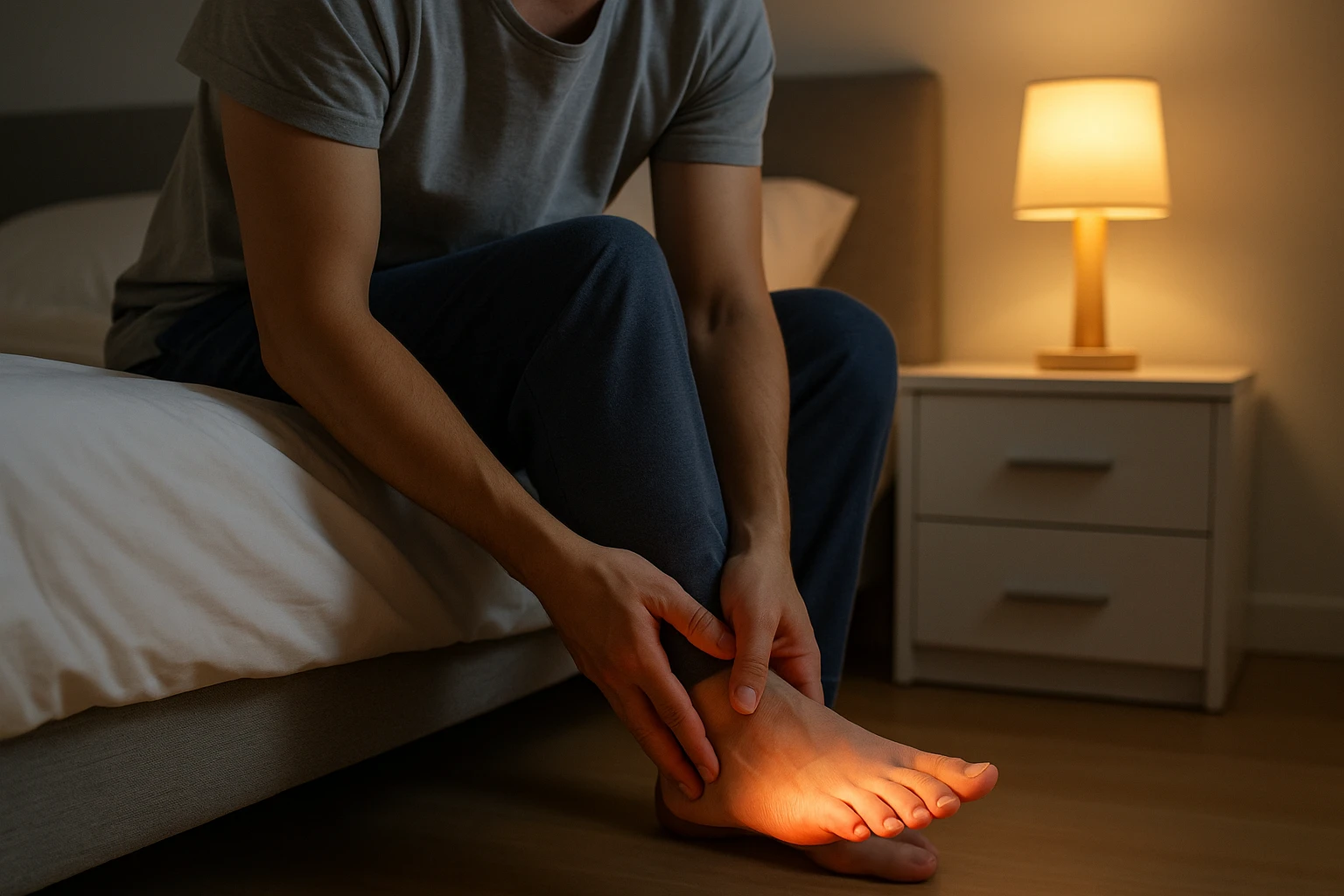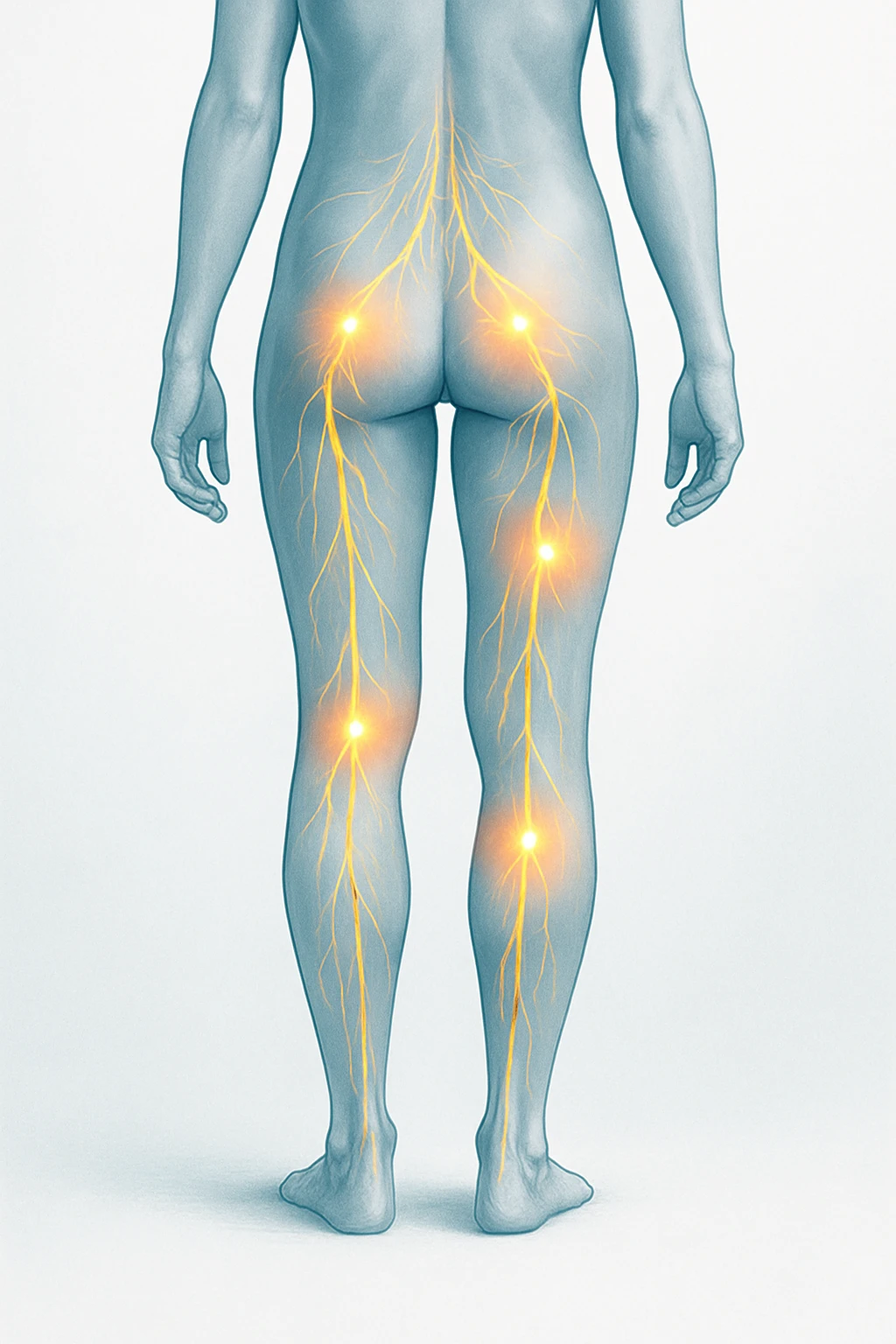Burning Feet at Night: Common Causes and Proven Treatments
Why Feet Burn at Night: A Closer Look
Many people notice a strange and sometimes distressing burning or tingling sensation in their feet when they settle into bed. This discomfort can range from a mild warmth to a persistent, painful burn that makes it hard to rest. Although it may seem like a harmless nuisance, burning feet at night can be an early sign that the nerves in the feet are irritated or overactive. Understanding why this happens is an important step toward relief and prevention.
<h3>What Does 'Burning Feet' Mean?</h3>
<p>Medically, the term "burning feet" describes a painful or hot sensation localized to the soles or entire foot. It often arises from <strong>peripheral nerve dysfunction</strong>-when the nerves that transmit signals between the feet and the brain become irritated, damaged, or overly sensitive. People commonly report:</p>
<ul>
<li>Burning or hot sensations</li>
<li>Tingling or electric-like feelings</li>
<li>Numbness or hypersensitivity</li>
<li>Discomfort that may come and go or persist</li>
</ul>
<p>Because the nerves in the feet are the longest in the body, they are especially vulnerable to damage or changes in signaling. When these nerves misfire, they can send false messages of heat or pain even when no injury or external heat source is present.</p>
<h3>Myth vs Fact: Poor Circulation or Nerve Trouble?</h3>
<table>
<thead>
<tr>
<th>Myth</th>
<th>Fact</th>
</tr>
</thead>
<tbody>
<tr>
<td>Burning feet are always caused by poor circulation.</td>
<td>While circulation problems can contribute to discomfort, burning sensations most often result from <strong>nerve dysfunction</strong> rather than lack of blood flow.</td>
</tr>
<tr>
<td>Coldness or cramping means your feet are burning due to circulation.</td>
<td>Poor circulation typically causes coldness, cramping, or pallor-not heat or tingling sensations.</td>
</tr>
</tbody>
</table>
<p>Recognizing this distinction helps guide proper evaluation. A burning feeling that worsens at night is more likely linked to nerve overactivity than to circulatory issues, underscoring the importance of discussing these symptoms with a healthcare provider.</p>
<h3>Nighttime Sensations Explained</h3>
<p>Many people find that burning or tingling intensifies once they lie down to sleep. Several factors can explain this nocturnal worsening:</p>
<ul>
<li>Fewer distractions make the brain more aware of subtle sensations.</li>
<li>Cooler nighttime temperatures can heighten nerve sensitivity.</li>
<li>Changes in body position may alter circulation and amplify the burning feeling.</li>
</ul>
<p>Although the discomfort may seem worse after dark, this pattern provides valuable clues. It suggests that the nerves are hypersensitive rather than that the feet are physically overheated. Paying attention to when and how symptoms appear can help doctors identify the underlying cause and begin treatment earlier-improving both comfort and sleep quality.</p>
The Medical Roots of Burning Feet
Burning feet at night are not a disease in themselves but a symptom that signals something affecting the nerves or structures of the feet. Understanding the possible causes helps identify whether the problem stems from widespread nerve damage, local pressure on a nerve, or other underlying factors. In many cases, the sensation reflects how sensitive and responsive the body’s nerve pathways can be to both internal and external influences.
<h3>Peripheral Neuropathy and Systemic Causes</h3>
<p>The most common medical explanation for burning feet is <strong>peripheral neuropathy</strong>-a condition where the nerves outside the brain and spinal cord become damaged or irritated. This disruption can interfere with normal signal transmission, causing sensations of burning, tingling, or pain even without external heat or injury. The underlying causes of peripheral neuropathy vary widely:</p>
<ul>
<li>Diabetes (prolonged high blood sugar can injure small nerve fibers in the feet)</li>
<li>Chronic alcohol use</li>
<li>Vitamin B deficiencies</li>
<li>Toxin exposure</li>
<li>Certain chemotherapy drugs</li>
<li>Thyroid disease</li>
<li>Infections such as HIV</li>
<li>Idiopathic neuropathy (unknown cause)</li>
</ul>
<p>When these nerves misfire or lose their protective insulation, they can send false messages of heat or pain to the brain. This type of nerve damage tends to progress slowly and may start with mild tingling before advancing to persistent burning or sensitivity that interferes with sleep and mobility.</p>
<h3>Entrapment and Mechanical Triggers</h3>
<p>Not all cases of burning feet come from systemic conditions. In some people, the cause is localized-where nerves are compressed or trapped as they pass through tight spaces in the foot or ankle. Common examples include:</p>
<ul>
<li><strong>Tarsal tunnel syndrome:</strong> compression of the tibial nerve near the inner ankle</li>
<li><strong>Morton's neuroma:</strong> irritation between the toes</li>
</ul>
<p>These mechanical pressures can disrupt normal nerve signaling, producing burning, tingling, or electric-like sensations that often worsen with activity or footwear pressure. Unlike systemic neuropathy, these localized forms may cause burning that is confined to specific areas of the foot. Identifying the site and nature of the discomfort helps doctors determine whether the problem is nerve entrapment, inflammation, or another structural issue.</p>
<h3>Why It Gets Worse at Night</h3>
<p>For many individuals, burning sensations intensify during the evening or at bedtime. Several factors explain this nocturnal pattern:</p>
<ul>
<li>Reduced distractions make the brain more aware of internal sensations, including nerve pain.</li>
<li>Cooler nighttime temperatures can alter nerve sensitivity.</li>
<li>Body position while lying down can change circulation and pressure on the feet.</li>
</ul>
<p>Together, these effects heighten sensitivity, making burning or tingling feel stronger even though the underlying condition has not worsened. This nighttime aggravation, though frustrating, can serve as a clue that the discomfort is nerve-related rather than due to an external cause such as inflammation or infection. Recognizing these patterns supports earlier evaluation and appropriate treatment to manage symptoms and protect nerve health.</p>
Who’s Most at Risk – and Why It Matters
Burning feet can affect anyone, but some people are more vulnerable because of conditions or habits that place extra stress on their nerves. Recognizing these risk patterns early allows for better prevention and timely care before nerve damage becomes advanced. The most common risk factors fall into two main categories: metabolic or endocrine disorders and lifestyle or nutritional influences.
<h3>Metabolic and Endocrine Conditions</h3>
<p>Diabetes is the leading medical condition linked to burning feet. High blood sugar over time can injure the small nerve fibers that carry sensory information from the feet to the brain. This process, known as <strong>diabetic neuropathy</strong>, often begins with subtle tingling or burning that intensifies at night. The nerve damage involves small-fiber injury and metabolic disturbances within the nerve cells, which make them more sensitive and prone to misfiring pain signals.</p>
<p>Other metabolic or endocrine disorders can have similar effects. Common examples include:</p>
<ul>
<li><strong>Thyroid disease:</strong> Slowed metabolism may disrupt nerve function, leading to sensations of heat or burning in the feet.</li>
<li><strong>Diabetes mellitus:</strong> Chronic high blood sugar causes progressive small-fiber nerve injury and burning pain.</li>
</ul>
<p>In all of these conditions, controlling the underlying disorder helps protect nerve health and reduce symptoms over time.</p>
<h3>Lifestyle and Nutritional Triggers</h3>
<p>Lifestyle choices and nutritional status also play important roles in nerve sensitivity. Key contributing factors include:</p>
<ul>
<li><strong>Chronic alcohol use:</strong> Can directly damage nerves and deplete essential vitamins needed for nerve repair.</li>
<li><strong>Vitamin B deficiencies:</strong> Often caused by poor diet, absorption problems, or certain medications, leading to neuropathy and burning sensations.</li>
<li><strong>Toxin exposure and medications:</strong> Some chemotherapy drugs and environmental toxins can harm peripheral nerves.</li>
<li><strong>Infections such as HIV:</strong> May directly affect nerve tissues and contribute to burning pain.</li>
<li><strong>Idiopathic neuropathy:</strong> In some people, the cause remains unknown but produces similar symptoms.</li>
</ul>
<p>Although these factors vary widely, they share a common outcome: nerve irritation that can manifest as burning or tingling sensations in the feet. Identifying and addressing these risk factors early offers the best chance to maintain nerve function and prevent progression.</p>
How Doctors Find the Cause
Because burning feet can stem from many possible issues, doctors begin by piecing together a clear picture of the patient’s health, lifestyle, and symptoms. The goal is to identify what is irritating or damaging the nerves and determine whether the problem is local, systemic, or related to another underlying condition. Early and accurate diagnosis is essential to prevent worsening nerve injury and to guide effective treatment.
<h3>Clinical Examination and Testing</h3>
<p>The diagnostic process usually starts with a detailed medical history, where the doctor asks about symptom timing, medical conditions such as diabetes or thyroid disease, and possible toxin or medication exposure. This is followed by a physical examination focusing on the feet, legs, and nervous system. The doctor checks reflexes, sensation, muscle strength, and skin integrity to look for signs of neuropathy or nerve entrapment.</p>
<p>Depending on the findings, additional tests may be ordered to confirm the cause. Common diagnostic steps include:</p>
<ul>
<li><strong>Blood tests:</strong> To detect diabetes, thyroid problems, or vitamin deficiencies.</li>
<li><strong>Nerve conduction studies:</strong> To assess how efficiently electrical signals move through the nerves.</li>
<li><strong>Imaging tests:</strong> Such as MRI or ultrasound to check for nerve compression or structural abnormalities.</li>
</ul>
<p>Together, these steps help identify whether the burning sensation arises from systemic neuropathy, localized nerve compression, or another medical issue.</p>
<h3>Red Flags to Mention to Your Doctor</h3>
<p>Some symptoms indicate that <strong>burning feet at night</strong> require prompt medical attention. These include:</p>
<ul>
<li>Persistent or worsening pain</li>
<li>New numbness or weakness</li>
<li>Changes in balance or walking</li>
<li>Visible wounds or ulcers on the feet, especially in people with diabetes</li>
</ul>
<p>Such signs may point to advanced nerve damage or poor circulation that can lead to serious complications if left untreated. Patients are encouraged to mention any recent injuries, infections, or new medications that coincide with the onset of burning sensations. Sharing this information helps clinicians rule out reversible causes and act quickly to protect nerve health.</p>
<h4>Questions to Ask Your Clinician</h4>
<ul>
<li>What tests can help identify the cause of my burning feet?</li>
<li>Could this be related to my existing medical conditions or medications?</li>
<li>What steps can I take to prevent nerve damage from worsening?</li>
<li>When should I schedule a follow-up or specialist visit?</li>
</ul>
Relief, Recovery, and Prevention
Managing burning feet at night begins with understanding and addressing the underlying cause. Because the sensation is usually a sign of nerve irritation or damage, treatment focuses on calming those nerves, improving comfort, and preventing further harm. With proper care and consistent monitoring, most people can significantly reduce symptoms and protect long-term nerve health.
<h3>Medical and Home Treatments</h3>
<p>Doctors often combine medical therapies with practical self-care to relieve burning sensations. When an underlying condition such as diabetes or vitamin deficiency is identified, controlling blood sugar or correcting nutrient levels becomes the first priority. For persistent pain, physicians may prescribe medications that target neuropathic pain or recommend topical creams to soothe irritated nerves.</p>
<p>At home, small adjustments can make a big difference in reducing discomfort and improving sleep:</p>
<ul>
<li>Keep feet cool but not cold.</li>
<li>Wear breathable socks and well-cushioned shoes.</li>
<li>Gently stretch or elevate the legs before bedtime to ease nighttime burning.</li>
<li>Maintain good foot hygiene and inspect for any irritation or wounds.</li>
</ul>
<p>Together, these strategies help create a calm environment that supports nerve recovery.</p>
<h3>Preventing Complications and Protecting Nerves</h3>
<p>For individuals with diabetes, burning feet are more than a discomfort-they can signal <strong>neuropathy</strong> that requires close attention. Daily foot checks for redness, blisters, or open wounds are essential since even small injuries can lead to ulcers if left untreated. Persistent or worsening symptoms should always be discussed with a healthcare professional.</p>
<p>Simple preventive steps can protect nerve health and reduce long-term risks:</p>
<ul>
<li>Check feet daily for cuts, swelling, or sores.</li>
<li>Keep blood sugar within a healthy range.</li>
<li>Limit alcohol intake and avoid smoking.</li>
<li>See a healthcare provider regularly for foot and nerve evaluations.</li>
</ul>
<p>Beyond diabetes, anyone experiencing chronic burning feet should schedule regular check-ups. Managing underlying causes-such as thyroid imbalance, alcohol use, or medication side effects-helps prevent further nerve injury. Early intervention remains the best defense against long-term complications.</p>
<h3>Living Well with Sensitive Feet</h3>
<p>While nerve-related symptoms can take time to heal, many people regain comfort and confidence by adopting protective habits. Maintaining steady blood sugar, eating a nutrient-rich diet, staying active, and avoiding tobacco or excessive alcohol all support nerve health. Regular communication with healthcare providers ensures that any changes in sensation are addressed promptly.</p>
<p>Living with sensitive or burning feet doesn't mean giving up mobility or restful sleep. With awareness, gentle care, and early action, it's possible to restore comfort and keep each step pain-free.</p>
Frequently Asked Questions About Burning Feet at Night
- Why do my feet feel like they’re burning mostly at night?
- Burning sensations often worsen at night because the body is at rest, distractions fade, and nerve sensitivity becomes more noticeable. Cooler temperatures and changes in circulation can also heighten discomfort.
<dt>Is burning in the feet always caused by poor circulation?</dt>
<dd>No. While circulation problems can cause coldness or cramping, burning feet at night are more commonly due to nerve irritation or peripheral neuropathy rather than poor blood flow.</dd>
<dt>Who is most likely to experience burning feet?</dt>
<dd>People with diabetes, thyroid disorders, vitamin B deficiencies, or chronic alcohol use are at higher risk. Nerve compression and certain medications can also play a role.</dd>
<dt>Can stress or anxiety make burning feet worse?</dt>
<dd>Stress doesn't directly cause burning feet but can heighten pain perception. When the nervous system is overactive, sensations like tingling or heat can feel more intense.</dd>
<dt>What tests do doctors use to find the cause?</dt>
<dd>Doctors may perform blood tests for diabetes or vitamin levels, nerve conduction studies to check nerve function, and imaging to look for nerve compression or injury.</dd>
<dt>Are burning feet a sign of diabetes?</dt>
<dd>They can be. Persistent burning or tingling in the feet is a common early symptom of diabetic neuropathy, caused by long-term high blood sugar damaging small nerves.</dd>
<dt>Can footwear affect burning feet at night?</dt>
<dd>Yes. Tight or poorly cushioned shoes can increase nerve pressure and irritation. Wearing supportive, breathable footwear helps reduce stress on the feet.</dd>
<dt>When should I see a doctor about burning feet?</dt>
<dd>Seek medical attention if symptoms worsen, disrupt sleep, or are accompanied by numbness, weakness, or open sores-especially if you have diabetes.</dd>
<dt>How can I soothe burning feet before bed?</dt>
<dd>Cooling the feet, gentle stretching, and elevating the legs can ease discomfort. Maintaining good foot hygiene and using breathable socks may also help improve nighttime comfort.</dd>
<dt>Is burning feet at night treatable?</dt>
<dd>Yes. Most cases improve with management of the underlying cause, medications for nerve pain, and consistent foot care guided by a healthcare provider.</dd>













